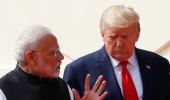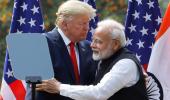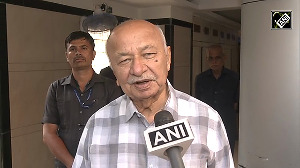The impact of Trump's announcement of increasing import tariffs will have negligible benefit for India not because of companies trying to shift from China to other countries or their supply chains being affected due to their Chinese operations but because of our faulty policies, explains Mudit Jain.

The headlines have been agog with the threat issued by President elect Donald Trump on increasing tariffs on China and singling out India for having very high import barriers in the form of custom duties.
Let's first understand what Trump said.
Trump is appealing to the Americans saying that the world has access to the US market but the US doesn't have equal access to other countries' markets.
He singles out high import duties in other countries compared to the US. Therefore, he wants to retaliate by imposing higher tariffs on countries who also have high tariffs to increase the cost of imported goods from the US into their respective markets.
Trump wants to levy an import tariff of 60% on China and on other countries ranging from 10% to 20%.
He singled out India saying the import duties in India on Harley Davidson motorcycles are over 100% which makes them prohibitively expensive in India and in turn wants to restrict imports of Indian goods into the US by increasing tariffs from India.
As per the WTO, countries have to have uniform import tariffs for all countries and their maximum rates are also specified beyond which a country cannot increase the tariffs.
Countries can impose anti-dumping on imports countrywise which is a separate exercise following WTO procedures.
However, if Trump is able to restrict imports of Chinese goods into the US, it could have a disastrous impact on India, with Chinese goods further flooding the Indian market.
As it is, India's trade deficit with China is already at an all time record high of over $100 billion and it will increase further with China dumping more goods into the Indian market as a result of being denied access to the US market.
With regards to the USA increasing import tariffs on India, it will have limited impact as India's exports to the US are more in the nature of software exports and not physical goods.
If the US were to impose a tax on outsourcing of services from the US to other countries, then India would be badly affected.
India's import tariffs are complicated. For industrial goods they are at a maximum rate of only 7.5% as against WTO bound rates of 40%.
This means that while India can increase its import tariffs to 40% for industrial goods, it has chosen to be much below it to a mere 7.5% for the past 20 years leading to outsourcing of manufacturing overseas by Indian companies.
For example, big business groups like the Tatas and Birlas amongst many others made huge acquisitions overseas from the late 1990s to the mid 2000s leading to no creation of jobs in India and shifting their emphasis on manufacturing overseas.
The companies acquisitions cost billions of dollars with international marquee names like Corus Steel, Jaguar, Novelis etc.
India became the second largest investor in Britain with the takeover of Corus Steel and Jaguar.
In addition, companies like Tata Chemicals and Nirma acquired soda ash companies in the US and elsewhere and started importing soda ash from their foreign operations into India rather than increasing domestic production leading to lesser production and jobs for India.
While it was an excellent decision for the companies to tap international markets and make their presence global, it had a negative impact on India by importing this overseas production into India.
For other food products such as milk, alcohol, cheese, automobiles etc the import tariffs in India are over 100% which is the reason US companies are complaining to Trump.

Similarly, the low tariffs on industrial goods was compounded further with the indiscriminate signing of FTAs with even lesser country specific import duties, leading multinational companies to export to India rather than invest in India to put up manufacturing plants.
For example, the imports of PVC resin are over 1 million tpa into India and despite this huge demand and supply gap being met by imports, no Indian company is increasing PVC resin production due to the very low arbitrage protection of import duties making it loss making to put up new plants.
Multinational companies should be incentivised to invest in India by increasing import tariffs drastically as it will make exports into India for them unviable.
But instead the world is making for India with the trade deficit last year touching a new record of over $250 billion, which is going to increase further in the coming years.
Many industries closed down due to cheaper imports as the input costs of power, furnace oil, interest and transportation costs are much lower than in India where they are prohibitively high to subsidise agriculture and government companies.
For example, the calcium carbide industry in India closed down in 2004 due to imports from China leading to loss of jobs and revenue via the multiplier effect of closure of related ancillary sectors.
This is only one example, there are numerous others.
Regarding the transport costs, the freight rate from China to south India is only 60% of the freight rate from south India to north India.
This is because there are no taxes on diesel internationally whereas it is taxed 100% in India via levies and duties and state taxes which are not set off in GST, being specifically excluded from it.
This is a double whammy for manufacturing in India, reduction of manufacturing in India by Indian companies and lack of investment in India by foreign companies.
And the companies who are manufacturing in India are plagued with higher input costs and the overly regulated system of approvals required for manufacturing which are time consuming and at times governed by outdated laws.

India could have benefited immensely due to covid by many companies wanting to shift from China or China plus 1 strategy.
Sadly, other proactive countries like Vietnam benefitted as the costs and hassles of doing business in India were not reduced or removed.
The much touted PLI scheme is mainly for manufacture of iPhones and there are measly or nil export benefits and none for investing.
Lower corporate tax rates do not matter as much as lower input costs which are very high in India supplied mainly by government companies supplying power, capital, furnace oil and transportation costs.
The impact of Trump's announcement of increasing import tariffs will have negligible benefit for India not because of companies trying to shift from China to other countries or their supply chains being affected due to their Chinese operations but because of our faulty policies.
Rather than India becoming atmanirbhar as per our prime minister's vision, the ground reality is that the world makes for India reflected in our record trade deficits year on year.
Mudit Jain is a businessman, people and society watcher and thinker.
Feature Presentation: Aslam Hunani/Rediff.com











 © 2025
© 2025